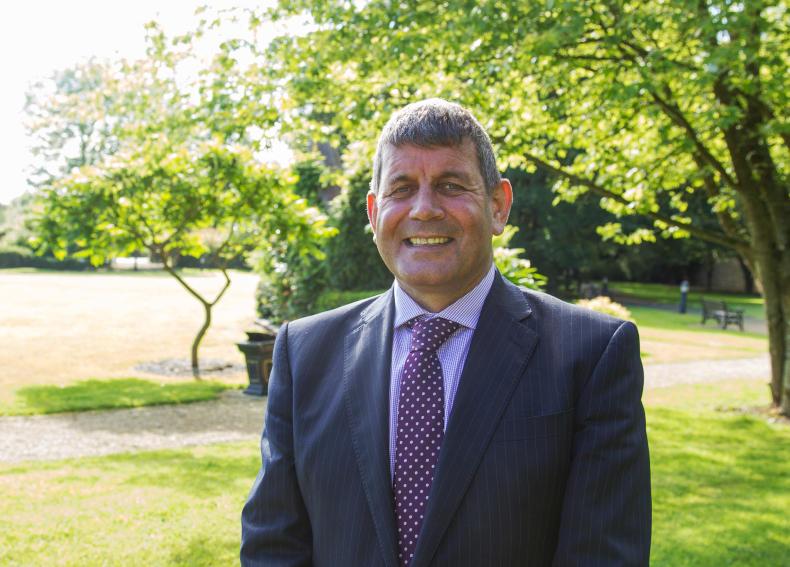The Department of Agriculture will adopt a “listening mode” in the upcoming round of CAP talks, according to Minister of State Andrew Doyle.
He was speaking at Teagasc’s Spring Economic Briefing in Enniscorthy on Friday.
Monday next 5 February sees the first in a round of six regional CAP consultation meetings take place in Carlow.
Minister Doyle will represent the Government, and he revealed that the meeting will see presentations from Teagasc, the EPA and senior staff from his own department, to set the scene for the conversation around Ireland’s negotiation position in relation to the CAP post-2020.
CAP budget
The final shape of Brexit will play a big part in determining the scale of the CAP budget, and Teagasc economist Trevor Donnellan painted some of the possible scenarios that could play out.
These range from the “BINO” option (Brexit in name only) where the UK will continue to make contributions to the EU budget, and no trade barriers will exist, to an extreme hard Brexit, where the UK will dismantle trade barriers with all nations, which would surely see its days as a high-value food market end.
This would actually be worse for Ireland than the imposition of trade barriers and tariffs – the so-called “Hard Brexit” – which would at least maintain Britain’s value as a food destination.
Donnellan speculated that the landing zone for the final Brexit deal would be somewhere in between the two extreme options.
Minister Doyle said that at this week’s council of ministers meeting, which he attended, it was explained that if the British contribution to the EU budget ends, the contribution of the remaining EU27 would have to increase from 1% of gross national product to 1.1%, or at most 1.12% to maintain budget funding at its current level.
Briefing
The Teagasc Spring Economic Briefing was held for professionals who work in or with the agri-food business.
It was the first in a dozen such events to be held around the country in the next couple of weeks, as part of the Teagasc ConnectEd programme, which sees Teagasc extend its knowledge transfer to the likes of accountants, business analysts, members of the banking and legal professions, and private advisers.
Membership costs from €195/year.
Pat Murphy, head of environment knowledge transfer at Teagasc, outlined that the same collaborative approach to knowledge-sharing informs the attempt to address Ireland’s most vulnerable rivers and streams.
Local authorities, Teagasc, and the co-ops are all putting resources into advising farmers in how best to manage their land and farmyards to ensure the highest level of environmental protection for their local water catchment.
A well-devised, well-executed nutrient management plan (NMP) is central to this effort.
Thousands of new NMPs will be in place on farms with the help of the various advisory teams by the summer. Watercourse management will also be an important aspect of the programme.
Read more
Doyle to draw first CAP fire
Public consultation launched for CAP 2020
The Department of Agriculture will adopt a “listening mode” in the upcoming round of CAP talks, according to Minister of State Andrew Doyle.
He was speaking at Teagasc’s Spring Economic Briefing in Enniscorthy on Friday.
Monday next 5 February sees the first in a round of six regional CAP consultation meetings take place in Carlow.
Minister Doyle will represent the Government, and he revealed that the meeting will see presentations from Teagasc, the EPA and senior staff from his own department, to set the scene for the conversation around Ireland’s negotiation position in relation to the CAP post-2020.
CAP budget
The final shape of Brexit will play a big part in determining the scale of the CAP budget, and Teagasc economist Trevor Donnellan painted some of the possible scenarios that could play out.
These range from the “BINO” option (Brexit in name only) where the UK will continue to make contributions to the EU budget, and no trade barriers will exist, to an extreme hard Brexit, where the UK will dismantle trade barriers with all nations, which would surely see its days as a high-value food market end.
This would actually be worse for Ireland than the imposition of trade barriers and tariffs – the so-called “Hard Brexit” – which would at least maintain Britain’s value as a food destination.
Donnellan speculated that the landing zone for the final Brexit deal would be somewhere in between the two extreme options.
Minister Doyle said that at this week’s council of ministers meeting, which he attended, it was explained that if the British contribution to the EU budget ends, the contribution of the remaining EU27 would have to increase from 1% of gross national product to 1.1%, or at most 1.12% to maintain budget funding at its current level.
Briefing
The Teagasc Spring Economic Briefing was held for professionals who work in or with the agri-food business.
It was the first in a dozen such events to be held around the country in the next couple of weeks, as part of the Teagasc ConnectEd programme, which sees Teagasc extend its knowledge transfer to the likes of accountants, business analysts, members of the banking and legal professions, and private advisers.
Membership costs from €195/year.
Pat Murphy, head of environment knowledge transfer at Teagasc, outlined that the same collaborative approach to knowledge-sharing informs the attempt to address Ireland’s most vulnerable rivers and streams.
Local authorities, Teagasc, and the co-ops are all putting resources into advising farmers in how best to manage their land and farmyards to ensure the highest level of environmental protection for their local water catchment.
A well-devised, well-executed nutrient management plan (NMP) is central to this effort.
Thousands of new NMPs will be in place on farms with the help of the various advisory teams by the summer. Watercourse management will also be an important aspect of the programme.
Read more
Doyle to draw first CAP fire
Public consultation launched for CAP 2020











SHARING OPTIONS